Akron mayor candidates share thoughts on Jayland Walker shooting, social justice issues
Civil and voting rights advocates quizzed the seven Democrats running for Akron mayor on their social justice agendas Thursday evening a mile from where Akron police shot and killed Jayland Walker last summer.
The event — organized by the Akron NAACP, League of Women Voters of the Akron Area, Akron Interfaith Social Justice Group, The Freedom BLOC, Akron Alumnae Chapter of Delta Sigma Theta Sorority Inc. and LWVAA — pressed the candidates on what they would have done differently had they been mayor during the days, weeks and months of protests and calls for reform after police killed Walker.
Candidate Mark Greer said "getting justice for Jayland Walker" is the biggest issue in the city. Everyone else on stage said crime and public safety is priority No. 1.
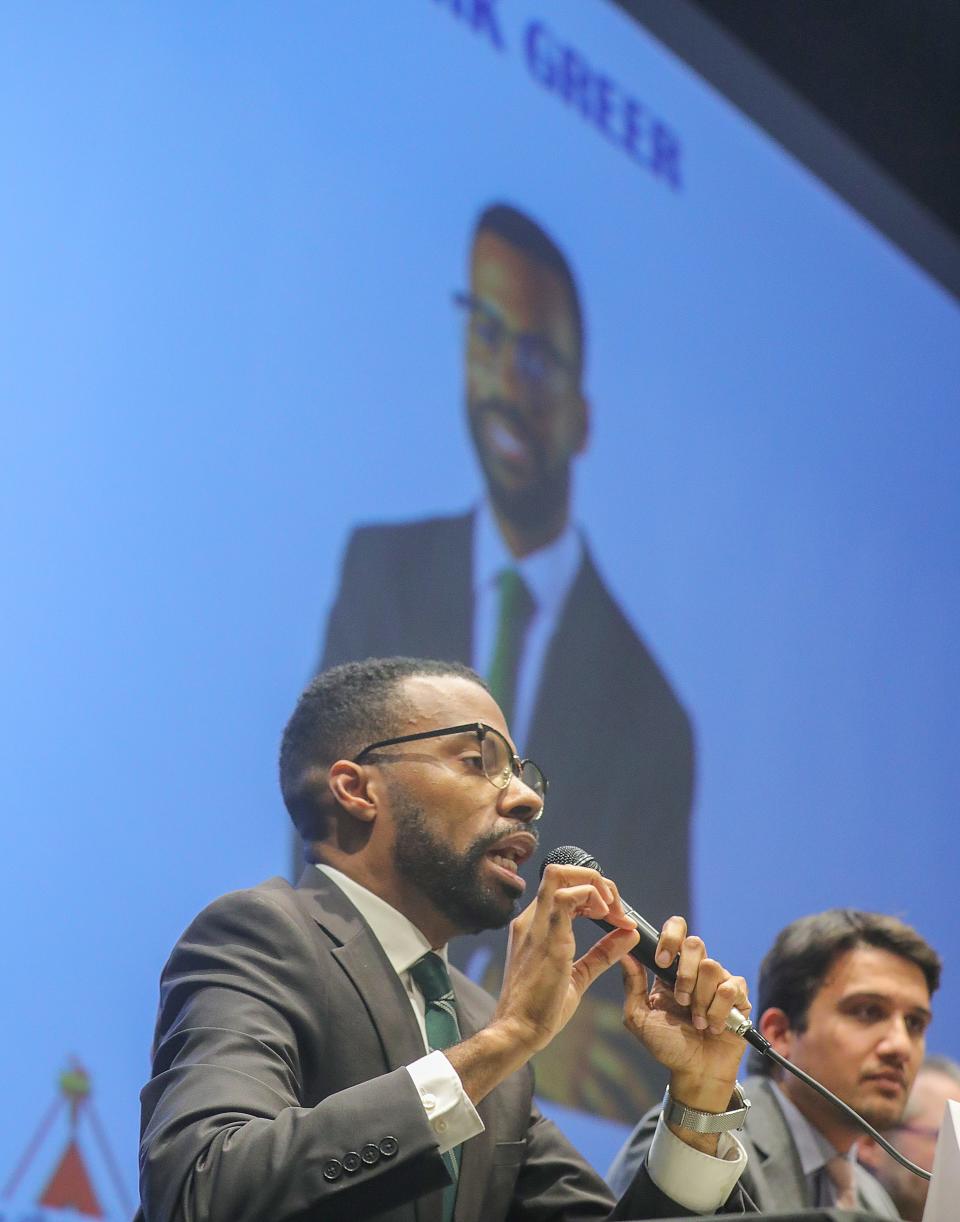
Before a crowd of a couple hundred people inside the auditorium at the new Garfield high school in Akron’s Firestone Park neighborhood, the candidates took familiar questions about their police reform and crime reduction plans while covering new ground, including ways to boost city contracts and economic opportunity for minorities, eliminate food deserts, create a "people's budget" and support immigrants, whether documented or not.
Akron mayor's race:Akron mayoral Democratic candidates exchange insults and ideas in first debate with all 7 present
Volunteers with voter registration forms reminded attendees that early voting in the May 2 primary begins April 4, and that state law now requires a government-issued ID at the polls — utility bills won’t do anymore.
What the candidates have to say about social justice
Inside the auditorium, moderator Cynthia Peeples, a board member on the League of Women Voters and founding director of Honesty for Ohio Education, asked the candidates to politely refrain from name-checking one another and keep their responses on their own positions as they answered questions on a series of social justice issues.
Akron Councilwoman Tara Mosley said signs around town proclaim Akron a "Welcoming City" but she would "hope that we would be a sanctuary city if we had to be." That status has been adopted by other city leaders who openly refuse to cooperate with federal immigration officials if they come looking for immigrants here illegally, who Mosley said should have a path to citizenship.
Cellphone store manager Joshua Schaffer would fill vacant houses with immigrants and decriminalize marijuana, shifting money instead to mental health services.
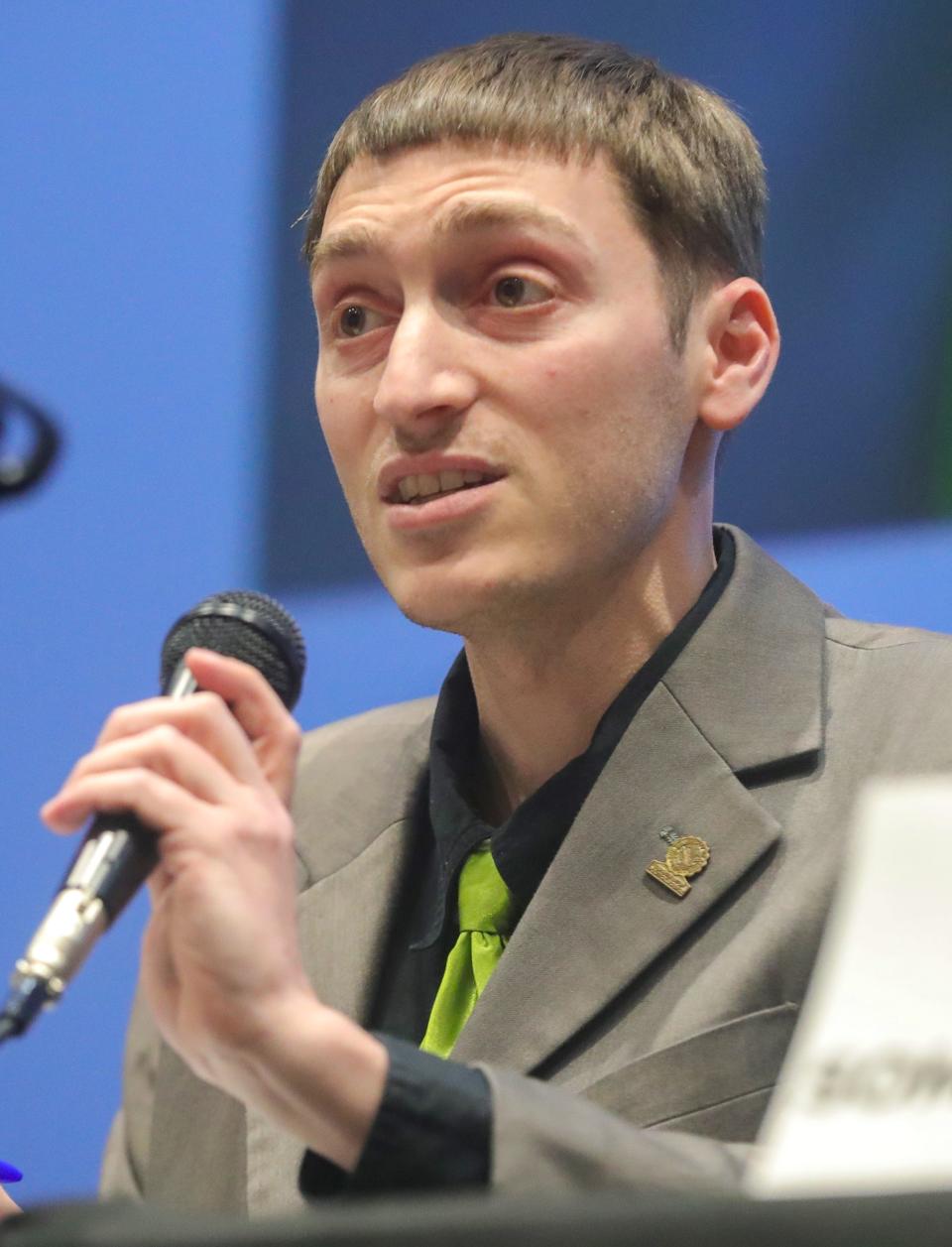
Akron Councilman Shammas Malik would open up community learning centers and demand more community policing, explaining that officers currently run from “call to call to call,” which the police chief confirmed this week in a budget hearing.
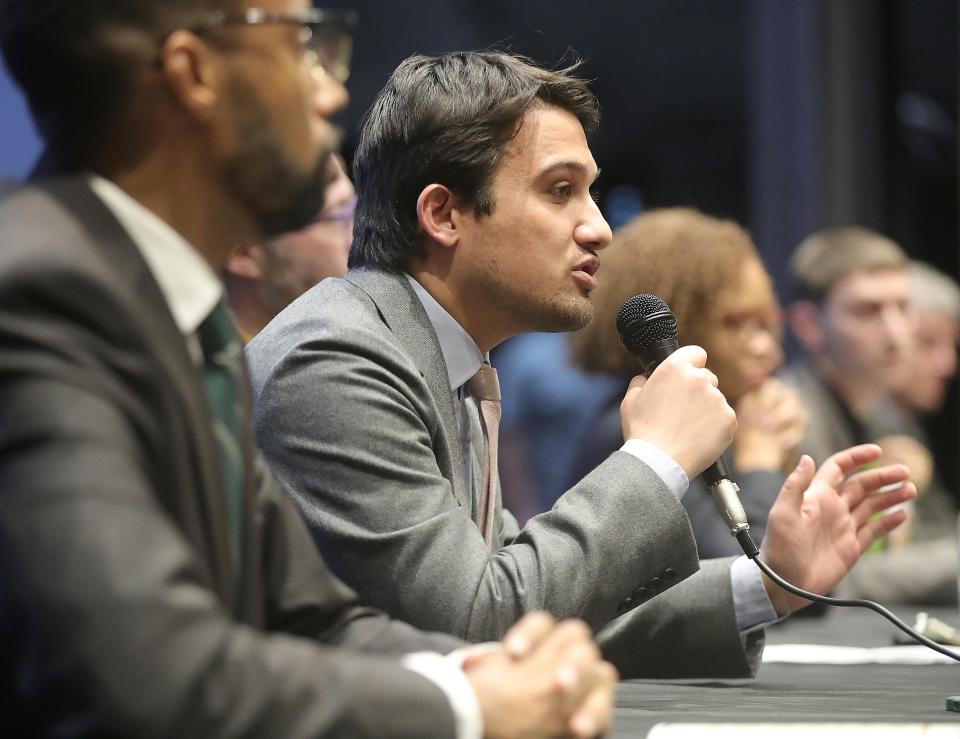
Mosley echoed the need for more foot patrols and reiterated her call for police substations in neighborhoods. She and Cleveland teacher Keith Mills would end high-speed police chases.
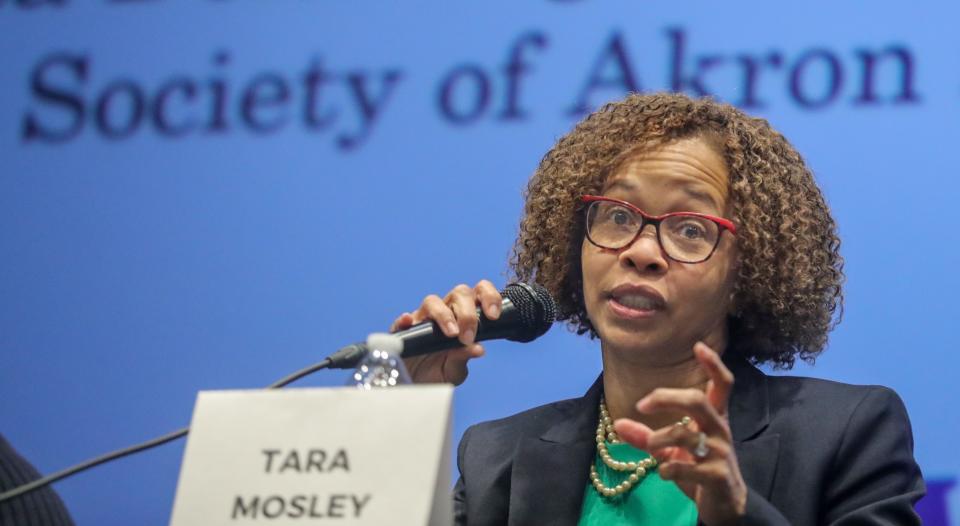
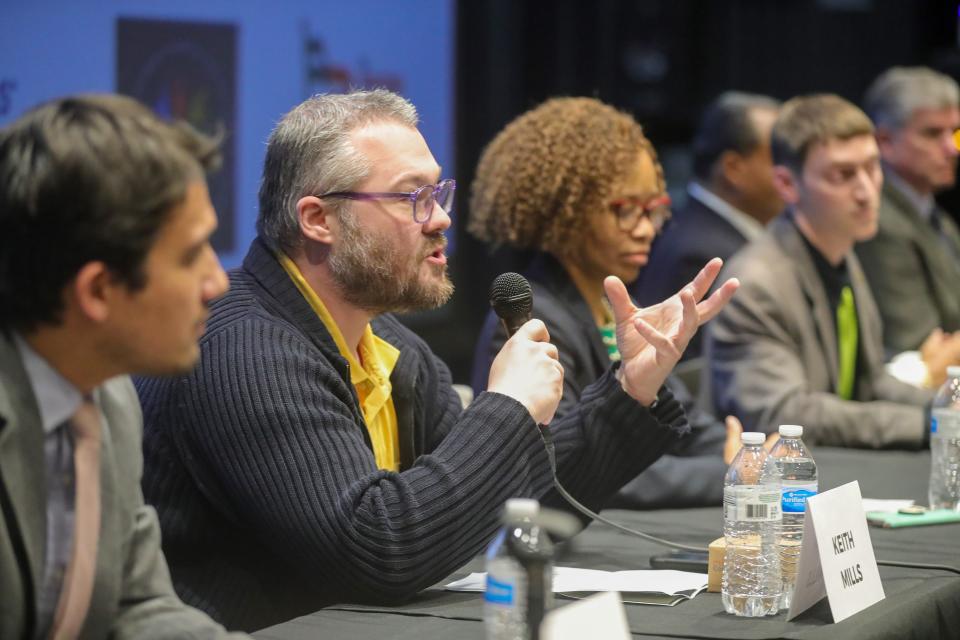
Deputy Mayor for Intergovernmental Relations Marco Sommerville again pitched a non-lethal dart system for police cruisers. The tracking darts would let officers make arrests when a suspect stops driving instead of forcing a dangerous chase.
He said after the event that it was "wrong" of him to say officers would "move in for the kill" instead of make the arrest.
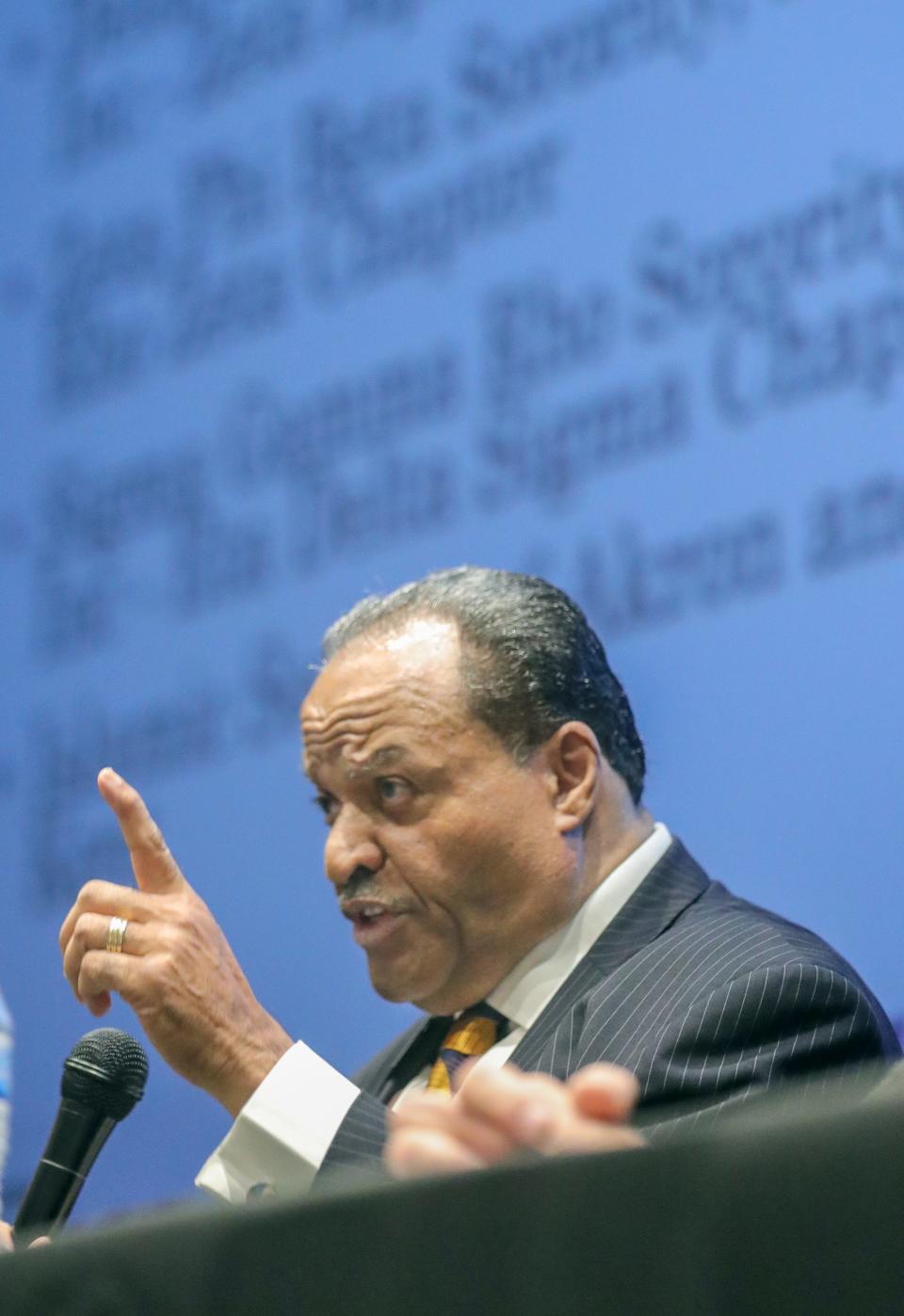
County Councilman Jeff Wilhite would drop prefabricated homes at $60,000 a pop onto vacant city lots to boost homeownership.
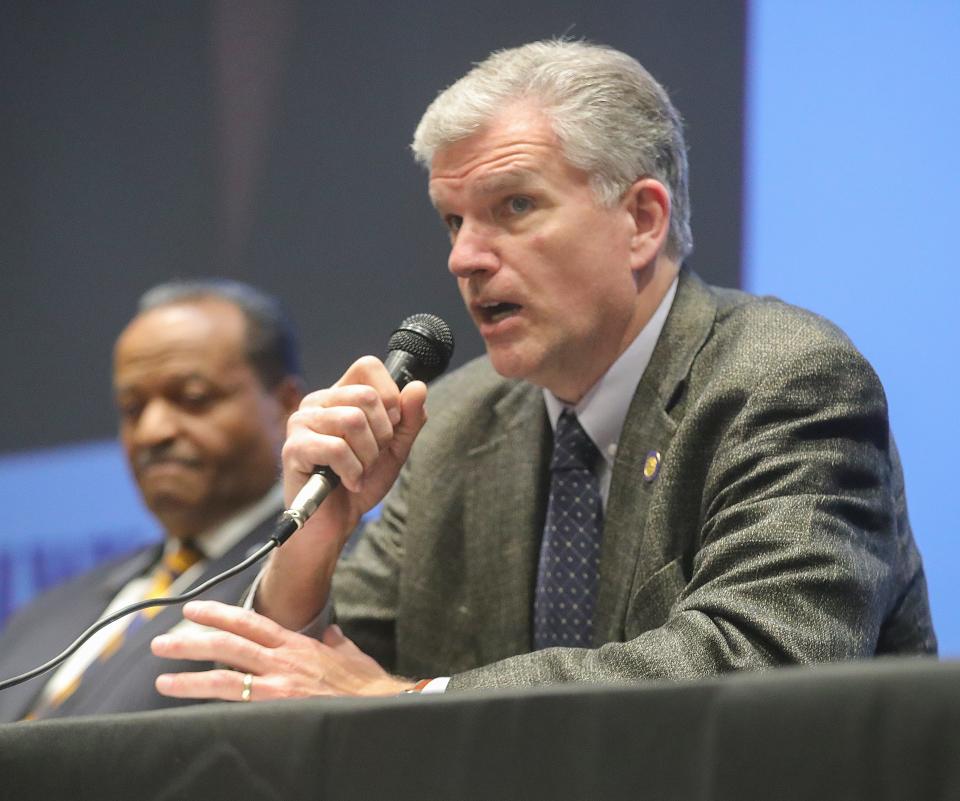
How would the candidates create economic opportunities for minorities?
Peeples asked the candidates how they would create economic opportunity and open city contracts to Black and brown business owners.
Greer, a former small business program manager in Mayor Dan Horrigan’s administration, said he’s worked inside city government long enough to know that the same contractors have been getting the same contracts “over and over and over again.”
Malik said he questioned the administration this week about how long it will take to replace the person who left in January from a position designed to boost the city's poor job at giving contracts to minorities, who got only 5% of the work in 2020.
Sommerville said he would hire local, like he did when he employed Black architects, accountants and builders for his funeral home business.
Schaffer urged less investment downtown and a green jobs economy.
Wilhite suggested not only hiring more Black business owners but marketing their products and services so “we can support them with our wallets.”
Was the Jayland Walker situation handled correctly?
The first question from the audience asked what each candidate would have done differently in the handling of what the person who wrote the question on a note card called “the murder of Jayland Walker.”
Walker, a 25-year-old DoorDash driver, was shot 46 times by Akron police after a crosstown vehicle pursuit that zigzagged through residential streets in Firestone Park from state Route 8 to a parking lot off East Wilbeth Road on the Bridgestone Americas campus.
Mills and Schaffer, who interned for U.S. Sen. Sherrod Brown, called the shooting a "murder."
The state Bureau of Criminal Investigation is continuing to review the incident, and the officers involved have not been criminally charged.
Mosley and Greer said the eight officers should have been fired. Though they condemned the level of deadly force used, they stopped short of calling for charges.
Mosley, Schaffer, Greer and Mills said the police union could fight to get the eight officers’ jobs back while the state investigates and a grand jury determines whether to indict any or all of the officers.
With Police Chief Steve Mylett in attendance, Greer criticized the administration for reinstating the eight officers the day after he and hundreds of people walked in a “March for Jayland Walker" in October.
Sommerville touted the administration’s choice to turn over the investigation to the Ohio Attorney General’s Office, which is something Akron officials had been contemplating for more than a year, according to the city prosecutor.
Wilhite would have immediately turned over all evidence, including body-worn camera footage, to state investigators. Instead, Horrigan and Chief Mylett, who are required by the city charter to release footage within seven days, called a press conference in which police narrated what happened. Sommerville, who said Thursday that Akron can’t heal until the state investigation is over, stood with the chief and mayor at the July press conference.
Greer criticized the press conference for accusing Walker of firing a weapon, which police say is the bang heard on body-worn camera video and the flash from Walker's window caught by an Ohio Department of Transportation camera.
“If we want to talk about waiting for an investigation to be finished, well, let's stop casting judgment on a dead young Black man who was shot at over 90 times,” said Greer, adding that he, as mayor, would have named the officers involved.
Malik disagreed with several actions taken by the city following the incident, including the removal of police name tags and an out-of-town protester “punched in the face” by an officer. The lawyer gave his opinion on why charges have been dropped for many people arrested during protests days after the July press conference.
Pepper spray, excessive force claims:What happened during the Jayland Walker Akron protests?
“There's all these people who were arrested for protesting," he said. “If someone hurt someone, if someone broke windows, you should prosecute them. The people being prosecuted and getting let off because they were arrested just for being out there in the street.”
How would the candidates increase resident engagement?
The audience asked about the candidates’ plans for public participation in the budgeting process and how each would root out corruption.
Sommerville, who has been in city government for more than 20 years, said he wasn’t aware of any corruption. He pushed for an online survey program to engage residents.
“Most time we don’t hear from the community when we should,” he said.
Mosley said the community is watching but not always “engaged because they don’t feel that they have a seat.” She called for each ward to have its own budget.
Wilhite said neighborhoods feel neglected. He’d create an endowment managed by ward council members and spent on neighborhood projects in partnership with the mayor’s office.
Greer said the problem isn’t that the people aren’t engaged but that city leaders aren’t listening.
On a question from the audience prompted by the Beacon Journal reporting this week on $30 million in contracts mostly unknown to council, Malik and Mosley responded by saying city lawmakers should approve all spending over $50,000, as the city charter requires.
Transparency in government:Akron council scrutinizes city contracts they didn't OK, including Plusquellic contract
“It may not be bad,” Malik said of the way city councils for 60 years have let the mayor spent without their approval, “but it looks terrible.”
Greer said he wasn’t surprised, noting that in his four years at City Hall, he’s seen proposals for contracts written in a way that ensures certain people get the work, to the detriment of small and minority business owners.
Reach reporter Doug Livingston at dlivington@thebeaconjournal.com or 330-996-3792.
This article originally appeared on Akron Beacon Journal: What Akron mayor candidates had to say about Jayland Walker, more

